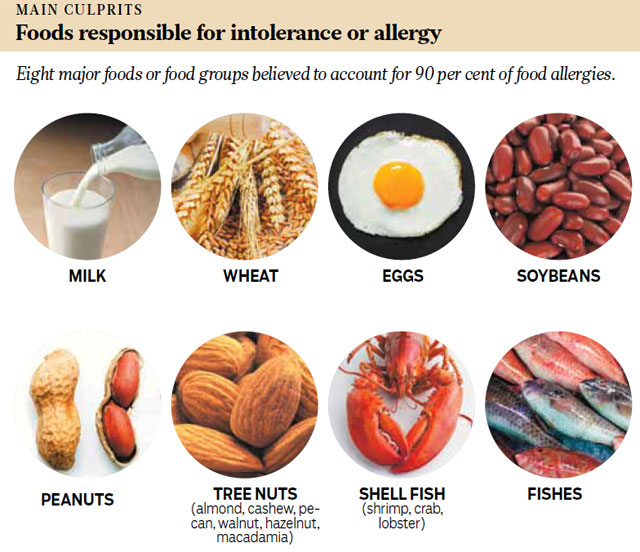It’s pretty common to have a reaction to a certain food, but in most cases it’s an intolerance rather than a true allergy. Why does it matter? Although they may have similar symptoms, a food allergy can be more serious.
These clues can help you figure out if it is an allergy or intolerance. A doctor can help you know for sure.
Food Allergy:
- Usually comes on suddenly
- Small amount of food can trigger
- Happens every time you eat the food
- Can be life-threatening
Food Intolerance:
- Usually comes on gradually
- May only happen when you eat a lot of the food
- May only happen if you eat the food often
- Is not life-threatening
Gluten-Free Diet for People With Gluten Allergies or Celiac Disease
Shared Symptoms
A food allergy and an intolerance both can cause:
- Nausea
- Stomach pain
- Diarrhea
- Vomiting
Different Symptoms
When a food irritates your stomach or your body can’t properly digest it, that’s an intolerance. You may have these symptoms:
- Gas, cramps, or bloating
- Heartburn
- Headaches
- Irritability or nervousness
A food allergy happens when your immune system mistakes something in food as harmful and attacks it. It can affect your whole body, not just your stomach. Symptoms may include:
- Rash, hives, or itchy skin
- Shortness of breath
- Chest pain
- Sudden drop in blood pressure, trouble swallowing or breathing – this is life-threatening. Call 911 immediately.
Common Food Allergies and Intolerances
These triggers cause about 90% of food allergies.
- Peanuts
- Tree nuts (such as walnuts, pecans and almonds)
- Fish
- Shellfish
- Milk
- Eggs
- Soy
- Wheat
The most common food intolerance is lactose intolerance. It happens when people can’t digest lactose, a sugar found in milk and dairy. Another kind of intolerance is being sensitive to sulfites or other food additives. Sulfites can trigger asthma attacks in some people.
What about a gluten allergy? While celiac disease – a long-lasting digestive condition that’s triggered by eating gluten – does involve the immune system, it doesn’t cause life-threatening symptoms.
Treatment for Food Allergy
Your doctor can find out if you have an allergy or intolerance. These things may help:
Keep a diary of the foods you eat and the symptoms you have
Stop eating some foods to help figure out which one is causing symptoms
Have allergy tests
If you have a food allergy, you’ll need to stop eating the food altogether. .If you have a food intolerance, you’ll need to avoid or cut back on that food in your diet. For lactose intolerance, you can look for lactose-free milk or take a lactase enzyme supplement.
With a food allergy, you could be at risk for anaphylaxis, a life-threatening reaction. Ask your doctor if you need to carry an Auvi-Q or Epi-Pen (epinephrine shots) that you could give yourself in an emergency. If so, always carry two injections with you.
How to Prevent Symptoms
Learn which foods – and how much – cause you to have symptoms. Either avoid the food or only have as much as you can without triggering symptoms.
When you eat out, ask your server about how your meal will be prepared. It may not always be clear from the menu whether some dishes contain problem foods.
Learn to read food labels and check the ingredients for trigger foods. Don’t forget to check condiments and seasonings. They may have MSG or another additive that can cause symptoms.

I didn’t know that one could be allergic to eggs. I eat a lot of them and sometimes I suffer from digestive problems. I wonder….
See what happens if you avoid all egg products for 3 weeks.
I recently solved a mystery of my own through a kind of elimination diet …
unfortunately, I may have an allergy to nuts (which is disappointing).
Being allergic to nuts would drive me nuts. I am going to see what happens with not eating eggs though. Thanks for pointing this out.
Reblogged this on My Meals are on Wheels.
Reblogged this on Gr8fullsoul.
This is some great information, and I appreciate your point that an intolerance to additives can cause asthma attacks in some people. My son had this happen to him a couple of days ago, and we weren’t sure what caused it. In my research about what could have initiated the attack, I came across some more good information at this site as well. http://www.allergytoday.com/article_allergies_to_food_additives.htm
My wife has been reacting strangely to some of the spices at our house and she thinks it might be a food intolerance. I like your idea about keeping a diary of all the foods you eat every day so you can pin down which is causing the problems. Once we get a better idea of what is causing it, we might go to a professional as well. Thanks for the help!
~ You are welcome ~